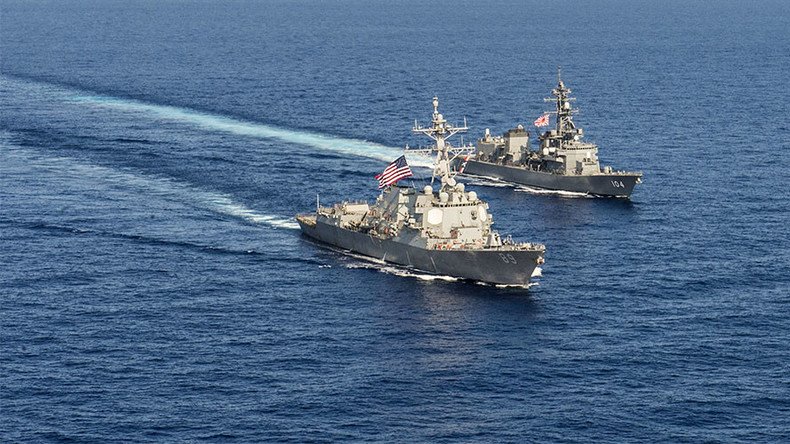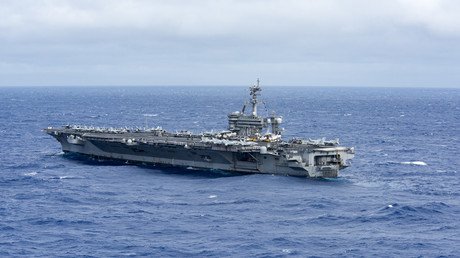Chinese fear US military 'tightening the encirclement' of their country

America is forming military alliances with a lot of China’s neighbors, reinforcing the idea among many Chinese that the US presents a real threat to their country in more ways than one, says independent China strategist Andrew K.P. Leung.
A fleet of American warships was deployed in the South China Sea for what the US Navy called a routine patrol. This came two days after China finished similar exercises in the same waters where they claim sovereignty.
The US ships are now due to pass right by a series of contentious islands leading to tension between the two countries.
The South China Sea has a long history of maritime disputes. Beijing claims almost all its surrounding waters are sovereign, but many regional powers, as well as the US, disagree.
RT: The US continues to defend its maneuvers in the South China Seas as "peaceful surveillance and other military activities." What is their interest in this part of the world?
Andrew K.P. Leung: America has always prided herself as an Asian Pacific power. If you look at the dominance of the American military and then the involvement of American businesses – they have always been there in the Asia-Pacific. What is different now is that America is putting a lot more on the military in the sense of forming military allies with a lot of China’s neighbors and increasing the strength of what America calls the ‘freedom of navigation’ in sending warships and patrolling more and more international waters very near to the islands where China’s claimed sovereignty.
So, this is reinforcing the idea that the US is tightening the encirclement of China and of course, this is a very sensitive issue to China. It is not just a question of sovereignty, it is also because of the South China Sea and the Asia-Pacific, it is very important conduit for trade and the importation of energy on which China’s economic survival and indeed regime stability depends.
I think there is a lot of at stake on China’s side. But as far as America is concerned, it wants to maintain its dominance and also maintain its leadership with its allies. So, I think that both sides need to manage the relationship. And on the other hand, apart from the military, the two countries are in many ways involved with one another, on trade, for example, America remains one of the largest markets for China.
RT: Mixed signals are coming from Donald Trump concerning China. He has made some very strong comments when talking about China. Are the Chinese upset with how Trump is handling bilateral relations thus far?
AL: I think that on the Taiwanese question, very quickly President Trump has backtracked from his challenge of the ‘One China’ policy and in his telephone call with President Xi he has already reaffirmed the ‘One China’ policy. This suggests that America doesn’t really want to go to war with China. Because this is a red line. It is not something negotiable; it is not something on the table. It is the table itself. The ‘One China’ policy is that important to China.
But on the other hand, the Trump administration seems to push the envelope further and further along with this “America first” strategy. That, of course, doesn’t tally with how the world works. If we look at trade, it is not just trade of one country to another or the products no matter what you have – your mobile phone, the clothes you wear, anything - China is embedded in it. And you can’t just slap tariffs on certain things without hurting the import of those components for your home production. So, I think the both sides need to manage the situation very carefully.
Spoke with Chinese President by phone. Spoke about One China policy and wall construction. They have a Great Wall and very few Mexicans!
— Donald Trump (@RealPresidentT) 11 февраля 2017 г.
Art of the deal
RT: Do you think Donald Trump will stick to the ‘One China policy’ or will he run the risk of conflict with China?
Ami Horowitz, political analyst: The great thing about Donald Trump is that you never know what he is going to do. That is kind of what he brings to the table. If you ask me what I think his game plan ultimately is here – I think it is within his book, The Art of the Deal. I think what he is looking to do actually is use the fact that he may look to backtrack off the ‘One China’ policy. Use that as a negotiating tactic to get what he wants trade-wise, possibly even militarily, getting them to push back from the Nin-Dash Line in terms of him solidifying and sticking with the ‘One China’ Policy. I think at the end of the day this is basically a negotiating ploy in policy for him. I think ultimately he will stick with the ‘One China’ policy, but get concessions from Beijing for that.
RT: Why did Trump send ships to the region? He knew it would elicit an angry reaction from Beijing...
AH: It is so funny hearing Beijing’s reactions to him doing that. They were scared he doesn’t do anything to upset their sovereignty. They don’t have sovereignty over those islands in the South China Sea outside of the territorial waters…He has every right to bring into the open seas any kind of commercial or military ships and vessels. So, it is insane for them to get upset about it. What they are doing by arming these islands in the South China Sea, trying to create that sea as essentially a swimming pool for China, that’s upsetting peoples’ sovereignty…
The statements, views and opinions expressed in this column are solely those of the author and do not necessarily represent those of RT.













